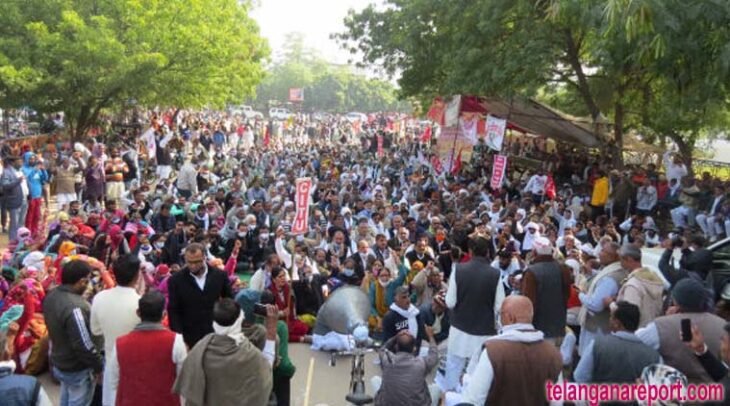
Farmer union leaders to meet, discuss plan of action
New Delhi, Dec 22 : Farmer leaders are expected to meet on Tuesday to discuss a plan of action as thousands gathered at protest sites on Delhi’s borders with Haryana and Uttar Pradesh to push for the repeal of new agri laws against the cold wave sweeping over the nation’s capital.
Efforts are underway by unions to gain the support of farmers in other states like Bihar for their demand to enact a law guaranteeing a minimum support price as the protest at border points has lasted for nearly four weeks now.
On Monday, farmers staged a relay hunger strike at various protest sites in batches of 11.
In the letter to 40 union leaders, Union Agriculture Minister Deputy Secretary Vivek Aggarwal on Sunday asked them to spell out their concerns about his earlier proposal for legislative amendments and to choose a suitable date for the next round of negotiations so that the ongoing unrest could end at the earliest.
The sixth round of negotiations on December 9 was called off following a standoff with farmers’ unions refusing to drop their demand to repeal all three laws.
Due to the continued unrest, Delhi traffic police said the borders of Singhu, Auchandi, Piau Maniyari and Mangesh were closed.
He advised commuters to take alternative routes across the toll tax borders of schools in Lampur, Safiabad Saboli and Singhu.
Police said that as traffic has been diverted from Mukarba and the GTK road, people are suggested to avoid the outer ring road, GTK road and the national road (NH) 44.
Those traveling to Haryana can pass through the borders of Jharoda (one way), Daurala, Kapashera, Badusarai, Rajokri NH-8, Bijwasan-Bajghera, Palam Vihar and Dundahera.
According to the traffic police, the Tikri and Dhansa borders are also closed to traffic, but the Jhatikara border was only open to two-wheelers and pedestrians.
At the Chilla border, the Delhi-Noida Causeway is open to traffic. The Noida-Delhi Causeway is however closed.
The Ghazipur border has also been closed to traffic.
Enacted in September, the three agricultural laws were projected by the central government as major reforms in the agricultural sector that will cut out middlemen and allow farmers to sell anywhere in the country.
However, protesting farmers expressed apprehension that the new laws would pave the way for the elimination of the minimum support price safety cushion and the abolition of the mandi system, leaving them at the mercy of big business.
The government has repeatedly claimed that the MSP and mandi systems will remain and accused the opposition of deceiving farmers.
